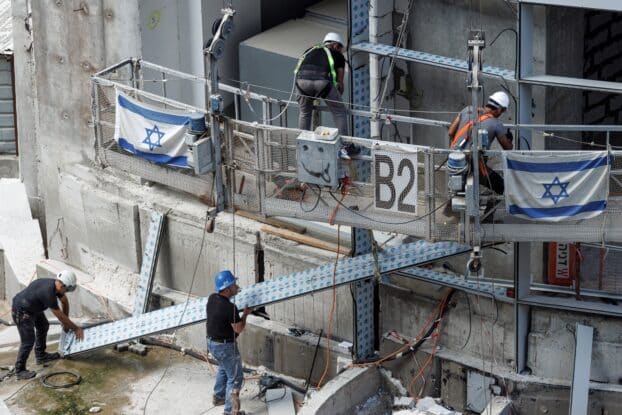This morning, Minister Ben Tzur signed an extension order for the collective agreement between the contractors and the Histadrut, effectively applying its terms to the entire construction sector – more than 250,000 workers. Among other things, a minimum wage of approximately NIS 8,000 was set for experienced laborers, NIS 16,000 for site managers, and a minimum wage of NIS 54 per hour for crane operators.
Labor Minister Yoav Ben Tzur this morning (Monday) signed an extension order for the collective agreement between the Histadrut and the Association of Contractors and Builders of Israel, the bodies representing workers and employers in Israel’s construction and infrastructure sectors. This means that the terms included in the collective agreement will become binding law and apply to all workers and employers in the sector, even if they are not affiliated with the Histadrut or the Association of Contractors and Builders of Israel.
Now, more than 250,000 workers are expected to benefit from the agreement’s terms, and the sector hopes it will encourage more Israeli workers to join in light of the halt in Palestinian labor since October 7th and the delays and difficulties in bringing foreign workers.
The signing ceremony included Histadrut Chairman Arnon Bar-David, Chairman of the Construction Workers Union Yitzhak Moyal, President of the Business Sector Dovi Amitai, and President of the Association of Contractors and Builders of Israel Roni Brik. In a joint statement, the parties said the order is “of special importance at this time, given the labor shortage in construction due to the war, and it guarantees improved conditions for workers, which will help attract additional labor to the sector.” The signing was approved by the Chief Labor Relations Officer at the Labor Ministry, Adv. Rivka Verbrener.

Under the now-binding collective agreement, a revision was made to promotion and construction wage tracks. It entails a dramatic shortening of the advancement pace in wage grades for many of the sector’s dozens of professions, emphasizing promotion needs and salaries. The agreement includes, among other things, an upgrade to the sector’s wage structure so that by this December, workers at grade 1 will earn NIS 6,300 per month, and upon completion of the increments, grade 4 workers will earn approximately NIS 8,000 per month, around 22% above the national minimum wage.
Also, under the agreement, the construction wage grades will be reduced from 8 to 4, aiming to create more significant wage increases for workers, and the dependence on the grading committee for promotions has been abolished. Completing professional training will shorten the time spent in a grade by two months, and an employer may shorten grade time by a year if the worker has completed significant professional training in their field.
Due to the significant labor shortage in the construction sector, a considerable wage increase was decided for site managers, so that a grade 1 site manager will earn NIS 10,000, with the wage floor gradually increasing to NIS 16,000 for a grade 4 manager at the end of the increment period (60 months). Automatic grade promotions will be granted every 4 years.
For crane operators, the agreement grants a wage supplement, setting their minimum hourly wage at NIS 54 per hour. The agreement also includes meal payments, increased holiday gift value, and increased clothing value.
A breakthrough for anyone wishing to enter the industry
Labor Minister Yoav Ben Tzur: “The construction sector is a central growth engine in the Israeli economy, and we are committed to ensuring its stability alongside improving workers’ conditions. Implementing the extension order will lead to a significant improvement in workers’ wages, bring new workers into the sector, and thereby help address the labor shortage since the ‘Iron Swords’ war. This is a significant step to ensure continued activity in the sector and strengthen the Israeli economy. Alongside improved conditions, we are working to ensure worker safety. Therefore, this agreement, which links better conditions with quality professional training, is another step to ensure workers can earn a respectable living and return home safely.”
Histadrut Chairman Arnon Bar-David: “I am proud to participate in this significant move, which will be an important milestone in Israel’s construction industry. The extension order is major news for thousands of sector workers and will substantially improve their pay and welfare. This major achievement sets a new and worthy standard for construction workers and will make the industry more attractive to new workers. The order guarantees not only fair wages, professional advancement, and protection of workers’ rights but also emphasizes workplace safety and encouragement of professional training. The Histadrut is committed to strengthening workers’ status in the construction industry and creating a safe and respectful work environment.”
Chairman of the Construction Workers and Related Industries Union in the Histadrut, Yitzhak Moyal: “After lengthy negotiations, a special collective agreement was signed introducing significant changes to wage tables and worker promotion. This provides a professional horizon and a better future for workers, and it’s great news for anyone wanting to enter a very rewarding industry. We also secured increased pension and provident fund contributions as well as a training fund. We placed special emphasis on the new generation of managers in the construction and infrastructure sector.”
President of the Association of Contractors and Builders of Israel, Roni Brik: “Our industry continues to be a symbol of worker promotion in Israel’s economy, including sectoral minimum wages higher than the national minimum. We continue to invest huge capital through the joint fund of the association and the Histadrut to promote and develop the construction industry – by expanding the workforce through training for new Israeli workers, training veteran workers, and effectively preventing workplace accidents through cultural change – a field where we all still have a lot to do. Additionally, we are advancing the development of technologies and tools to improve and accelerate construction. I am committed to preparing Israeli contractors for the coming years in which the sector will undergo a technological leap that will undoubtedly attract many Israelis.”

Nadlan Center is Israel’s leading real estate news and knowledge platform in Hebrew, created for industry professionals. Founded by experts in the field, it delivers in-depth, up-to-date coverage on urban renewal, planning and construction, taxation, and housing policy — tailored to the needs of developers, investors, planners, and financiers. In addition to its widely read news content, Nadlan Center hosts major industry events, professional conferences, and training programs that support the growth and development of the Israeli real estate sector.
Learn more: https://www.nadlancenter.co.il







